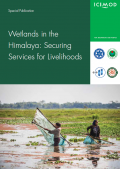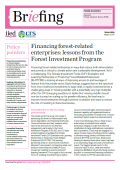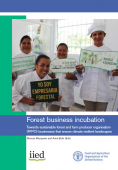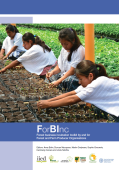

Financing forest-related enterprises in ways that reduce both deforestation and poverty is critical to climate action and sustainable development. The Climate Investment Funds (CIF) ‘Evaluation and Learning Partnership on Financing Forest-Related Enterprises’ (ELPFFRE) is looking at ways of improving access to and leverage of finance from the private sector. This International Institute for Environment and Development (IIED) briefing presents early findings from the evalutation. These findings suggest that on the spectrum from micro livelihood investments to large debt or equity investments lies a challenging weak or ‘missing middle’, with a potentially very high multiplier effect for CIF. Emerging questions to tackle this ‘missing middle’ should now be focused on scaling up for greater efficiency, the best way to improve forest enterprise through business incubation and ways to reduce the risk of investing in these businesses.

Forest business incubation is a support process that accelerates the successful development of sustainable businesses in forest landscapes. There is much to develop. The aggregate gross annual value from smallholder producers within forest landscapes may be as much as US$1.3 trillion.
Forest Business Incubation: Towards Sustainable Forest and Farm Producer Organisation (FFPO) Businesses that Ensure Climate Resilient Landscapes demonstrates how to overcome business incubation challenges in remote forest landscapes. These may include low densities of educated entrepreneurs, high logistical costs, scarce infrastructure to differentiate products, and few capable business mentors. The book includes an introduction to the forest business incubation service delivery model, detailed case studies are presented of attempts to deliver business incubation services in forest landscapes, an analysis of the data presented by the case studies and some observations and conclusions about how best to develop forest business incubation in the service of both forests and people.

